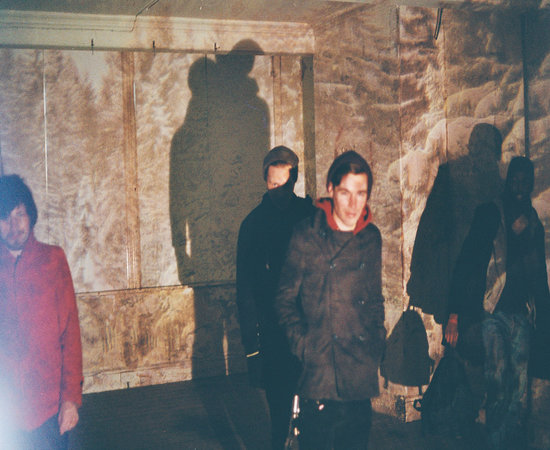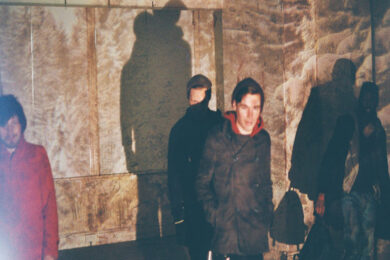Wake up maybe as early as 10am, bleary-eyed and tousled hair, the befouling odour of last night’s cheap spirits thick in the roof of your mouth. Check your iPhone, photos are already on Facebook from last night. Like. Like. Like. Check laptop to check the progress of the albums you started downloading overnight. They’re all done. Listen to a couple of tracks from the first one you downloaded – they’re pretty good, so update your Twitter status to say how much you love it. Check for RTs. None. Stumble into a lecture you’re paying too much for and sigh into a heap at the back of the theatre, motionless for the next two hours. You’re not failing but you’re not doing much else either. Head back home, re-open your browser. Vaguely notice something on the front page about North and South Korea engaging in conflict, consider reading more but decide to click on the latest episode of The Apprentice instead. Wait for your dinner to get delivered and make plans to go out again. Drink. Take drugs. Avoid. Ignore. Forget.
For a large part of a generation of late teens and early 20 somethings in Britain, this is how they exist, passively drifting sideways, oblivious to the creaking foundations the society supporting such nonchalance rests on, or worse still, aware of them but completely accepting of the situation. The recent student protests were such an anomaly with current youth malaise that they gained rather a lot more publicity than they might have, say, 20 or 30 years ago. Our elders watch us decay within bubbles, too absorbed in our own vacuous worlds to try and resist it. For the most we seem fine with that.
Such lingering apathy is something that Liverpool’s We Came Out Like Tigers detest, fight against with tooth and claw; indeed there’s a sense that they both as band and individuals would struggle to function had this chasm between what’s wrong and what people are doing to rectify it not opened up in Britain – a feeling made all the more palatable when their guitarist Fabian Devlin flashes his eyes venemously towards my dictaphone and rounds on it, stoically claiming "people who say ‘I don’t really care,’ that’s not acceptable."
I’m meeting him, vocalist/violinist Simon Barr and drummer Rik Fisher (bassist Mykle "Ollie" Smith is otherwise engaged) in a rather austerely upholstered vegetarian café called MelloMello. Situated somewhat innocuously on the shoulder of what it calls the city’s "omnipresent neon brand haven of uber-consumerism," the faded setting classes itself as part of the fiercely independent movement that’s gripped those on the periphery of the flashing commercial hub that snakes through its centre. We Came Out Like Tigers are an integral part of this too; they run their own fanzine called Brickface, put on gigs both for themselves and others in squats, warehouses and art spaces such as Wolstenholme Creative Space, just down the road from Mello’s. They’re one group of many in the city adopting a resolutely DIY approach, creating a scene in the traditional sense – communal in its nature and committed to making sure that acts get the right gigs with the right people. "I think the Liverpool music scene’s brilliant," enthuses Barr, "I’ve heard a few people criticise it and it makes me really cross. It’s quite a new scene definitely, but there’s so many people working so hard…we just put on a show in the same venue that we’re screen printing all our patches for our upcoming tour, and where we’ll be recording our next EP; everything’s self-contained and self-preserving."
Their last output was the ferocious melancholy of "There is good hope, thou will seest thy friends"; self-released in April and long since sold out physically, it’s a deeply personal five-track EP, ripping the flesh off the sounds of Orchid and Circle Takes The Square and then taking a hatchet to the bare skeleton, tearfully turning its bones to dust. Only occasionally do the group withdraw from the mutilated frenzy to take in the carnivorous scene of their own making. They’ve only got heavier too; recent recordings have hinted that any trace of their lighter edges have been dimmed, most evident on possible future release ‘A Lesson In Solitude’ where its initial, fluttering violin becomes engulfed by a tumultuous cascade of guitars from which Barr’s lacerating roar leaps off to flatten the now screaming strings firmly in its wake. Lyrical content is deeply personal, their EP was written at a time when their vocalist’s father was in hospital suffering from pancreatic cancer, and it’s only by pouring their very souls into matters like this that they feel they can progress.
"From the start we’ve set out to make our music as emotional as possible" says Devlin, "the only way you can do that is by writing about what it is that’s upsetting to you. It’s not such an easy thing to do, but what else are you going to write about when it’s going about in your head all the time?" These aren’t songs of petulant self-absorbance though; on occasion today ‘Tigers describe themselves as screamos ("because we don’t like the term hardcore basically, there’s a lot of negative connotations with that term") but theirs is a more cathartic message, recognising something currently avoided by so many, a truth hidden often hidden under walls of reverb and throwaway, wispish vocals – that these are broken times we’re living in. Each day passes with an intangible, yet disturbingly noticeable shadow in tow, yet it’s an era we’re living through together and one where any victory we can scrap for within it should be sought out: "Make the most of the positive and the negative. You can’t ignore one or the other," opines Fisher.
What excites about this group is their fearsome passion for what they do, and how insistent they are to channel that on their own terms. An obvious comparison to make, but one hugely complimentary, is the way they carry themselves in a manner resembling the strictly controlled DIY and political approach of Fugazi. "We run our band in a political context and a lot of things in that context we disagree with, at the moment we’re running against a current structure that we believe is wrong," lights up Devlin again, who goes on to reveal the group took part in the recent nationwide student protests; "we’re politically aware because, well, who isn’t? That’s a cop out if you say you’re not. Everything you do exists within a political context and you have to acknowledge that."
"It’s not necessarily saying ‘you should be like this,’" adds Fisher "it’s saying you should question yourself." The band’s fanzine they write, Brickface, does just that, setting out what people’s rights are in dealing with the police, calling out pay to play promoters within Liverpool and accusing bands of abandoning their principals when appearing in magazines such as Front. "Some bands are disgraceful by choosing to appear in some magazines; you can’t call yourself a punk rock band then appear in Front – I don’t know why that’s become acceptable all of a sudden," admonishes Devlin; but surely there has to be compromise involved for bands these days, if they want to make their music contribute to some of their livelihood? Such a question sees the trio shift uncomfortably in their seats, before Barr dismisses that as a get out clause, "these are just very apathetic times we’re dealing with, things have started kicking off a bit, but it’s an apathetic time. Bands have gone the same way – they’ve decided not to stand out against things any more."
Upon interviewing them this afternoon, it’s fascinating to note how the three of them deliver lines from what is largely the same hymn sheet. The tall, blonde-haired Barr sits upright, confidently delivering replies with declarative statements, daring you to disagree with him when talking about things like the recent riots in London’s student protests, where he storms "the police are beating people up – and last year they killed a couple of people – so whose the aggressor here?" His Irish guitarist however sits over, constantly hunched in thought; each time another person opens their mouth is a time spent deliberating about what else to say, at times he can’t always find the requisite words to say, at others it’s like he’s struggling to stem a relentless flow of consciousness. Fisher, meanwhile, is louder off record, but on it he’s largely happy to let the other two ruminate, only interjecting to clarify a point, or answer a question directly relating to him. His influence on the group is more keenly felt than words though, his arrival towards the end of 2009 has pushed We Came Out Like Tigers onto harsher, heavier plains and the rest of the group clearly hold him in great respect – they went as far as cycling to a house party they knew he’d be at in order to get him to join the group. "That’s true!" laughs the drummer "you literally turned up, brought me drinks and got me drunk!" Now the group intend to all live together, something that’s not such a great leap as they pretty much "spend a stupid amount of time together anyway." It’s something that excites them, "it’s really important; it means your ideas are evolving together, everyone’s working in the same direction. We’re all coming in from different perspectives, but someone will watch a film, for example, and then make us watch it and we’ll all see where they’re coming from."
We Came Out Like Tigers take their message on tour shortly – along with Cornwall hardcore group Kasa – commencing in Manchester on December 12th. Their live show is a visceral, confrontational experience which ups their recorded ante even further – on their last visit to the city, one spectator confessed to be "terrified of them," but it’s not an attempt to terrorise that drives their live show, more a case of putting people on the spot and forcing them to decide whether they’re happy to shroud their inner passions in irony and passiveness, or to release themselves, recognise anything inside that’s eating them up and realise it needs doing something about. "There’s a lot of insanely bored people in the world who just sit behind their computer screens and complain," muses Devlin, "and they’d gain so much if they started a band, or started a zine, or started reviewing or putting on shows. It’d just get them involved and they’d meet so many new people, and rather than being bored they’d be constantly inspired." In times of uncertainty people either cower away or step up to the fire front, We Came Out Like Tigers are defiantly doing the latter.



